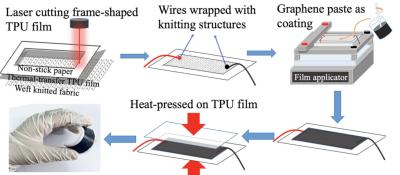Researchers from the UK's Imperial College London have developed graphene-based flexible clothing sensors that can detect body movement, with potential applications in injury rehabilitation, human-computer interaction systems, and athletic training.
The researchers produced a new type of graphene-based TPU/textile composite sensor using small-scale manufacturing techniques such as laser cutting, film coating, and thermal transfer.
The team performed sensitivity, reliability and durability tests to evaluate real world usage of the fabric sensors. The developed composite sensor reportedly exhibited a high sensitivity (GF = 498), wide sensing range (0%–293%), excellent reliability and stability which only shows 5% deviation after 10,000 cycles of stretching under 5% strain. In addition, the graphene-based textile composite sensor thermalized by TPU film also maintained high stability after long-term UV irradiation and multiple washing cycles.
When integrated into various wearable devices, the composite sensor detected a wide range of human body motions accurately, as well as subtle physiological signals, exhibiting great potential in incorporating into wearable monitoring devices.
Lead author Joy Zhou, PhD candidate at the Dyson School of Design Engineering, said: “Graphene has traditionally been too fragile to incorporate into clothing sensors, but our new technique makes them much more robust. Our sensors exhibit great potential for wearable monitoring devices.”


